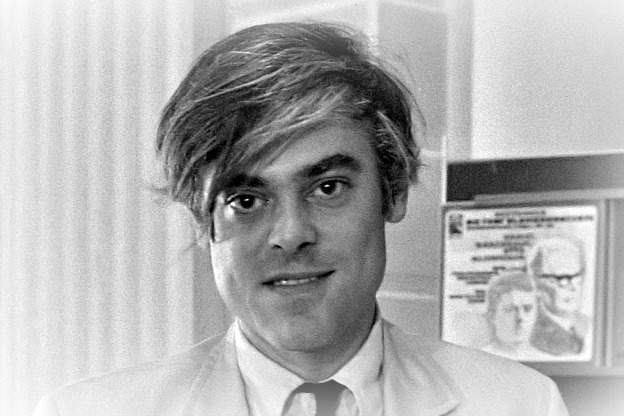
We'll start with a chaconne by Henry Purcell, performed by the Brüggen-Consort.
Remembering Rameau
The year 2014 marked the 250th anniversary of the death of Jean-Philippe Rameau. The French (baroque) composer and theorist is remembered as a great thinker, a prolific composer, and a difficult man. Little is known about Rameau’s early life. He was so secretive, according to a contemporary eulogy, that not even his wife knew much about the first 40 years of his life!
Let’s listen to a piece from Rameau’s first book of Pièces de clavecin en concerts published in 1741. These chamber pieces for violin, viola da gamba and harpsichord feature a fully written-out harpsichord part—an unusual feature during this time period.
French writer Alexis Piron said of Rameau, “His heart and soul were in his harpsichord; once he had shut its lid, there was no one home.”
Rameau’s father, a local church organist, took the musical education of his children seriously. According to his son’s eulogy, he “he taught them music even before they had learned to read.” Despite his early start in music, Rameau did not compose his first opera, Hippolyte et Aricie, until he was nearly 50 years old! However, over the next thirty years, he would go on to write nearly thirty dramatic works. Let’s hear a piece from Dardanus, performed by Tafelmusik Baroque Orchestra.
Brüggen
On August 13, 2014, the early music community lost a true pioneer when Frans Brüggen passed away in Amsterdam at the age of 79.
The Dutch conductor and recorder player was well known for his virtuoso playing, his pioneering work in the field of historically informed performance, and a well-documented rebellious streak. He was a co-founder of the Orchestra of the 18th Century—a Dutch period instrument ensemble that has become famous for its unusually egalitarian structure.
American recorder virtuoso Gwyn Roberts wrote:
“Reflecting on the death of Frans Brüggen, I realize how very different my own life would have been without his. When I was 13, I heard the Leonhardt Consort recording of the Brandenburgs, with Brüggen and van Hauwe on recorder, and my mind absolutely boggled that the instrument I had been playing for fun since I was little could do THAT!”
While Frans Brüggen spent much of his career engaged with the works of the great masters such as Beethoven and Bach, he also ventured far out into the realms of much more obscure music. A significant amount of that exploration took place within the avant-garde recorder trio, Sour Cream, which he founded in 1972. The group’s last recording, The Passion of Reason, recorded in 1993, explored the concept of the medieval quadrivium—the academic subjects of arithmetic, geometry, music, and astronomy, which together with the trivium—grammar, logic, rhetoric—make up the original seven liberal arts.
The Orchestra of the 18th Century, which Frans Brüggen co-founded in 1981 with Sieuwert Verster, has never strayed too far from its original mission. To this day, the group performs mostly 18th century repertory with the occasional early Romantic composer thrown in for good measure. The orchestra has an unusually egalitarian structure. After expenses are covered, all profits are divided equally among the conductor and members of the orchestra. The group never holds auditions. Co-founder Sieuwert Verster once told the New York Times, [quote] “We are a bit like the Rolling Stones, always the same people.”
[Brüggen seemed to have a particular love for the “Eroica” Symphony, which he conducted more than 100 times over the course of his career!]
Francesco Mancini: Solos for a Flute
On our featured release Francesco Mancini: Solos for a Flute, we’ll hear from the Chamber Players of the Philadelphia-based Tempesta di Mare Baroque Orchestra. Over the course of this recording, these four musicians perform on nine different instruments!
Francesco Mancini was born in 1672 in Naples. He trained as an organist and eventually became a celebrated opera composer. His XII Solos for a Violin or Flute were published in London in 1724. Of the twelve sonatas in the collection, eight are featured on this recording. Let’s hear Sonata V in D major.
Break and Theme music
:30, Dardanus / Temple de la Gloire, Tafelmusik Baroque Orchestra, Tafelmusik Media 2012, B007N0SV3I, Jean-Philippe Rameau, Dardanus: Airs tres vif (excerpt of 1:14)
:60, Frans Brüggen Edition, Frans Brüggen, Teldec/Warner Classics 2012, Thomas Morley, D.3, T.13: “Il Lamento” a 2 (excerpt of 2:13)
:30, Francesco Mancini: Solos for a Flute, Tempesta di Mare Chamber Players, Chandos 2014, Sonata I in D minor: Tr.21 Amoroso (excerpt of 2:03)
Theme: Danse Royale, Ensemble Alcatraz, Elektra Nonesuch 79240-2 1992 B000005J0B, T.12: La Prime Estampie Royal
The writer for this edition of Harmonia is Elizabeth Clark.
Learn more about recent early music CDs on the Harmonia Early Music Podcast. You can subscribe on iTunes or at harmonia early music dot org.









